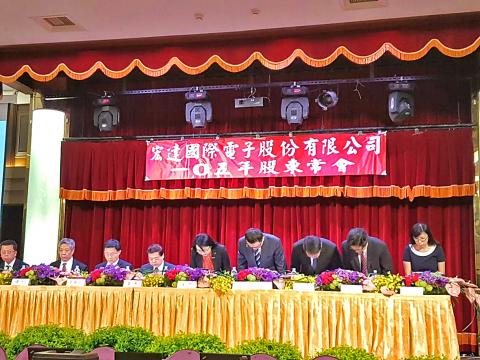HTC Corp (宏達電) chairwoman and chief executive officer Cher Wang (王雪紅) yesterday apologized to shareholders for the company’s disappointing performance in the past year, but avoided answering shareholders’ questions on when HTC would swing back to profit.
“I understand that an apology would not solve the issues, but I hope the shareholders have faith in HTC, as we have built a solid foundation for success through our efforts in VR [virtual reality] business in the past year,” Wang said at the company’s annual general meeting in Taoyuan.
The smartphone company reported a net loss of NT$15.53 billion (US$477.85 million), or NT$18.79 per share, for last year, compared with a net income of NT$2.35 billion, or NT$1.8 per share, in the previous year.

Photo: CNA
Wang said it is not difficult to make HTC’s VR business profitable, but the company has to seek strategic partners and invest more in contents and platforms in a bid to build a VR ecosystem and secure a leading position in the emerging market.
She said the company in April launched a US$100 million accelerator program for VR start-ups in Taipei, Beijing and San Francisco.
HTC plans to expand the program to speed up the technology’s development and increase contents for its VR headset Vive, she added.
Given that the VR business would play the most important role in HTC’s growth in the next 10 years, the company has established a wholly owned VR subsidiary, Wang said.
Chang Chia-lin (張嘉臨), head of HTC’s global sales division, said HTC might allow future strategic partners to invest “a small amount” of stakes in the subsidiary, but ensured that it would have no affect on the interests of HTC shareholders in the VR subsidiary, as HTC is to remain the largest shareholder.
Chang said the company has developed several new business models in the VR ecosystem for long-term growth, but he declined to elaborate on the details of the business models due to increasing international competition.
In response to shareholders’ concerns regarding HTC’s troubled smartphone business, Chang said the sales performance of this year’s flagship model M10 is much better than the last year’s M9.
Chang said sales of M9 last year were much lower than the company’s expectations, causing problems and dragging HTC’s overall performance from the second quarter of last year to the first quarter of this year.
Through several quarters of efforts, HTC has lowered 40 percent of its operational costs in the second quarter of this year, compared with the same period last year, he said.
With improvement in user experience and inventory management, M10 has generated profits at retail channels since it was launched at the beginning of this quarter, Chang said.
The robust demand for M10 has also helped drive up demand for HTC’s other smartphones by about 20 percent, he added.
HTC shares dropped 1.73 percent to close at NT$90.8 in Taipei trading yesterday.

In a small town in Paraguay, a showdown is brewing between traditional producers of yerba mate, a bitter herbal tea popular across South America, and miners of a shinier treasure: gold. A rush for the precious metal is pitting mate growers and indigenous groups against the expanding operations of small-scale miners who, until recently, were their neighbors, not nemeses. “They [the miners] have destroyed everything... The canals, springs, swamps,” said Vidal Britez, president of the Yerba Mate Producers’ Association of the town of Paso Yobai, about 210km east of capital Asuncion. “You can see the pollution from the dead fish.

MULTIFACETED: A task force has analyzed possible scenarios and created responses to assist domestic industries in dealing with US tariffs, the economics minister said The Executive Yuan is tomorrow to announce countermeasures to US President Donald Trump’s planned reciprocal tariffs, although the details of the plan would not be made public until Monday next week, Minister of Economic Affairs J.W. Kuo (郭智輝) said yesterday. The Cabinet established an economic and trade task force in November last year to deal with US trade and tariff related issues, Kuo told reporters outside the legislature in Taipei. The task force has been analyzing and evaluating all kinds of scenarios to identify suitable responses and determine how best to assist domestic industries in managing the effects of Trump’s tariffs, he

TIGHT-LIPPED: UMC said it had no merger plans at the moment, after Nikkei Asia reported that the firm and GlobalFoundries were considering restarting merger talks United Microelectronics Corp (UMC, 聯電), the world’s No. 4 contract chipmaker, yesterday launched a new US$5 billion 12-inch chip factory in Singapore as part of its latest effort to diversify its manufacturing footprint amid growing geopolitical risks. The new factory, adjacent to UMC’s existing Singapore fab in the Pasir Res Wafer Fab Park, is scheduled to enter volume production next year, utilizing mature 22-nanometer and 28-nanometer process technologies, UMC said in a statement. The company plans to invest US$5 billion during the first phase of the new fab, which would have an installed capacity of 30,000 12-inch wafers per month, it said. The

ASML Holding NV, the sole producer of the most advanced machines used in semiconductor manufacturing, said geopolitical tensions are harming innovation a day after US President Donald Trump levied massive tariffs that promise to disrupt trade flows across the entire world. “Our industry has been built basically on the ability of people to work together, to innovate together,” ASML chief executive officer Christophe Fouquet said in a recorded message at a Thursday industry event in the Netherlands. Export controls and increasing geopolitical tensions challenge that collaboration, he said, without specifically addressing the new US tariffs. Tech executives in the EU, which is